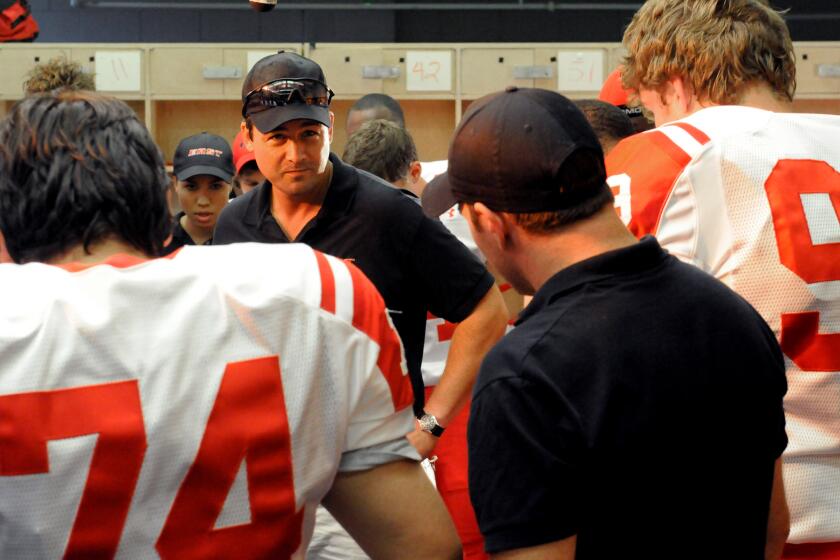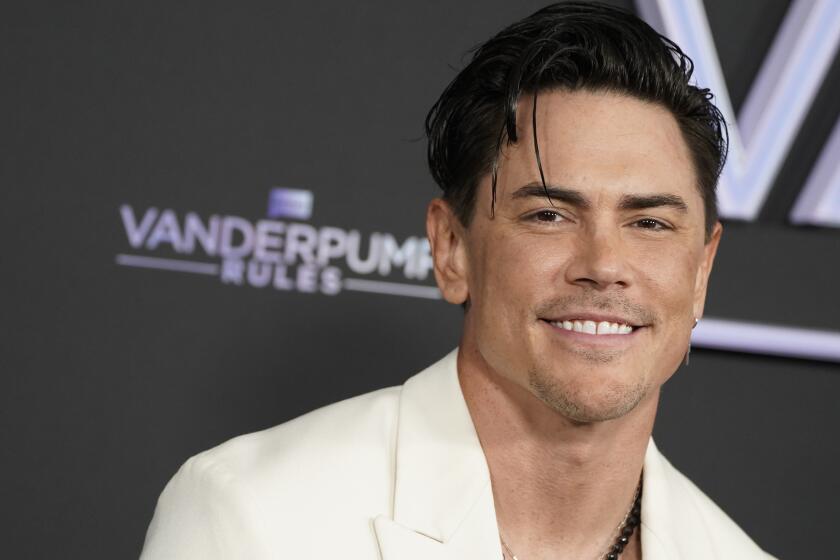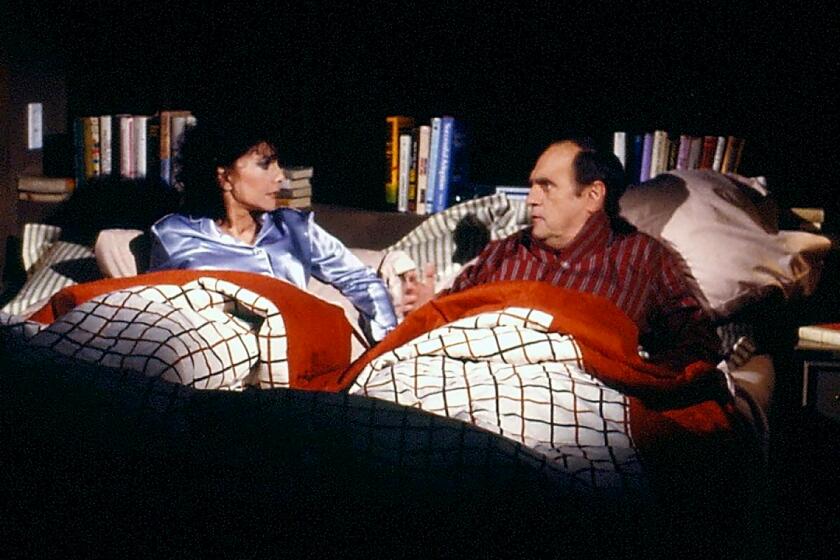Taking Us Back to the Ball Game : PBS’ ‘BASEBALL’ HOLDS A MIRROR UP TO AMERICA
The game of ball is glorious.
--Walt Whitman
“Somebody told me, ‘What are you doing this for Ken? It’s just a game! ‘ I said, ‘My goodness, a game? This is like the Noh drama of our society. This is theater. This is a great intersection. The game is an intersection of fact and metaphor.’ ”
It’s a month before the baseball strike would cripple the national pastime, and filmmaker Ken Burns is talking with near-religious fervor about the sport. The 41-year-old documentarian, who became a superstar thanks to his highly rated, award-winning 1990 PBS epic “The Civil War,” has been immersed for the last five years on his latest enterprise for public broadcasting.
This new documentary, aptly titled “Baseball,” covers more than 150 years of American history, clocking in at a whopping 18 1/2 hours. “Baseball” unfolds as a drama of near-Shakespearean proportions, filled with intrigue, deceit, treachery, melodrama, action, love, passion, pathos, community, violence, heroes, fallen heroes and villains.
At press time, with the baseball strike strill threatening regular and postseason play, “Baseball” looked like the only chance to see any type of World Series action.
(The documentary chronicles the last time a dispute canceled the World Series: In 1904, when John McGraw, the scrappy manager of the National League’s New York Giants, refused to have his team play the American League’s Boston Pilgrims because of a fight with American League founder Ban Johnson.)
Burns envisions “Baseball,” which premieres Sunday on PBS and is presented in 9 two-hour “innings” over the next two weeks, as a sequel to “The Civil War.”
“I knew that it was a way to understand the country we had become after the Civil War,” explains Burns, who now sports long hair, beard and a colorful baseball tie.
“(Historian) Shelby Foote says the Civil War defined us,” Burns says. Baseball, he believes, is the story of “the country that we would become. When you say history, you normally think you have to follow a political narrative, but I think that since the Civil War the political narrative has failed us in many, many regards. Baseball is so tied in with powerful emotions for men, but also for women, that this is a way to understand race, to understand immigration and assimilation. This is the way to understand labor. This is the way to understand what the country is doing without sort of having a didactic history lesson.”
The sport, Burns says, is a mirror in which one can see refracted “all the tendencies of the country. The first progress in civil rights in this country since the Civil War occurs not anywhere but in the national pastime.”
Narrated by John Chancellor, “Baseball” features the voices of Adam Arkin, Keith Carradine, Ossie Davis, Julie Harris, Gregory Hines, Gregory Peck, Paul Newman, Jason Robards, Garrison Keillor. Among the on-camera “witnesses” are writers and historians Roger Angell, Thomas Boswell, Doris Kearns Goodwin, Dan Okrent, George Plimpton, Studs Turkel and George Will; broadcasters Red Barber, Bob Costas, Vin Scully; fans Mario Cuomo, Billy Crystal and “The Civil War’s” Foote. Also included are former players Henry Aaron, Dotty Green, Mickey Mantle, Ted Williams and Curt Flood.
But “Baseball’s” scene-stealer may well be the charming, poetic Negro League veteran John (‘Buck) O’Neil, 82, who spent 30 years with the Kansas City Monarchs and was the first black coach hired by a major league club when he joined the Chicago Cubs in 1962.
Through remarkable still photographs and footage, “Baseball” tells the stories of such greats as McGraw, Williams, Mantle, Aaron, Christy Mathewson, Ty Cobb, Honus Wagner, Walter Johnson, Babe Ruth, Lou Gehrig, Joe DiMaggio, Satchel Paige, Josh Gibson, Stan Musial, Pete Rose, Bob Gibson, Roger Maris and Willie Mays.
The documentary also chronicles the famous “Merkle Boner” and the “Shot Heard Around the World” and explores such controversies as the 1919 Black Sox scandal, which nearly ruined baseball, and the exclusion of African Americans from the majors until 1947, when Jackie Robinson broke the color barrier as a member of the Brooklyn Dodgers.
Even though the series will be competing with the start of the networks’ fall season, Burns seems unfazed. In fact, he says, the timing is deliberate. “People say, ‘Boy, you will get hit.’ I say, ‘We are not interested in ratings. We just want to put on a good show.’ ” Besides, he points out, “The Civil War” also premiered during the fall season and became the highest rated show to date on PBS. “I was up against ‘The Queen of Mean’ and something else I can’t remember,” Burns quips. “I love that.”
While the documentary is still airing on PBS, Turner Home Entertainment will bring out the video set ($180) on Sept. 23 “for the VCR-challenged among us, including myself.” The $60 coffee-table companion book, penned by Burns and his “Baseball” co-writer Geoffrey S. Ward, hits the stores on Labor Day.
Burns acknowledges that fans’ fervid passion for the game, which comes through so evocatively in the documentary, isn’t what it used to be. “I think the game recedes in importance and is threatened, so to speak, and overshadowed by other sports,” he explains, over an iced tea at the Universal Hilton Hotel. “I think it’s actually coming back. I think we have already peaked in distraction away from the game. I see more and more kids playing the game in the last few years than I’ve seen in a long, long time. I believe basketball has peaked and is headed down the back slope and football has definitely peaked.”
Unlike basketball or football, says Burns, anyone can play baseball. “You don’t have to be 7 feet wide or 7 feet tall. The other sports are about ritualized warfare, kind of action in the moment and that’s all there is. It evaporates. You ask even a lot of sportswriters, how many points does Wilt Chamberlain have? How many yards did Walter Payton have? They have no idea.”
That’s not the case with baseball. When one asks a sportswriter how many home runs Aaron hit (755) or how many home runs Yankee slugger Maris hit in 1961 (61 to break Babe Ruth’s record set in 1927), “everybody knows,” Burns says.
“There’s a sense that time matters,” Burns explains, “because there is no clock in baseball. It means something that a .300 hitter now is the same as a .300 hitter 40 years ago and all the way back.”
The documentary offers an in-depth look at African Americans in baseball from the late 19th Century, when Moses (Fleetwood) Walker became the first black man to play in the major leagues in 1884, to the rise of the Negro Leagues in the 1920s. The series profiles such legendary teams as the Homestead Grays, led by slugger Josh Gibson, and the Kansas City Monarchs, powered by the remarkable pitching of the great Satchel Paige.
In previous documentaries and in the 1976 feature “The Bingo Long Traveling All-Stars and Motor Kings,” Burns says, filmmakers have treated the Negro Leagues as either “a minstrel show” or a “horrible tragedy. Neither of it is true. The Negro Leagues were glorious evocations of a blossoming black culture in this country and we should treat them as such and attach it to our mainstream and not vulcanize it in some little black history month.”
Burns has spent the summer spreading the gospel of “Baseball” by touring major league ballparks, throwing out first pitches and even playing in the celebrity game before the All-Star Game.
While acknowledging all the hype, Burns quotes historian Arthur Schlesinger Jr.: “ ‘There’s too much pluribus and not enough unum,’ ” Burns says. “There are very few things that remind us of the union where so many of our personal and collective blessings flow. What will bring us together: male, female, young, old, black, white? There are few places that you can come to the table and experience what Abraham Lincoln called the better angels of our nature. That’s all I’m interested in. I’m interested in more unum.”
He achieved that the previous Friday when he visited Chicago’s Wrigley Field. “We sat there with 40,001 people. I threw out the first pitch in front of 40,000 other people. When we sang ‘The Star-Spangled Banner’ together loud --and if there were more black faces in the crowd I would have been really happy--you just felt there was this possibility of community. That’s what baseball reminds you of.”
And the ballpark, Burns believes, is a “modern kind of secular cathedral planted in the midst of the grid of our cities that relieves that grid.
“You look at a map of downtown L.A. and there is this glorious thing (in the middle). It’s great. It just interrupts the flow of the city. The time is so different in the ballpark. Your personal memory (of baseball) connects you to certain times and underneath the collision of all of these social forces are really powerful emotions of time and memory and family.”
Burns’ love affair with baseball began as a child. Playing ball, he says softly, “was a refuge from a horror of a childhood which was filled with tragedy.” Burns’ mother suffered from cancer for several years and died when he was 11.
“By the time of the end of the ‘60s, when baseball was politically uncool because of Vietnam and the anti-Establishment feeling, I left it, and there was a void until I began working on this project. I didn’t know what happened from ’68 to 1975 when I came back into it with a vengeance. I came back in taking pleasure in something I had always loved and now I know nothing more satisfying and pleasing to me than playing baseball.”
Burns doesn’t think 18 hours is an excessive amount of time to cover the sport. “I thought it would be nine one-hours and what happened was, we were covering 200 years of history.” In order to do the documentary in the same fashion as “The Civil War,” the series needed to expand by nine hours. And it could have been longer--Burns had 18 hours of material on the Babe, who dominates the “Fourth Inning.”
Nostalgia is a dirty word to Burns. He took great pains not to make “Baseball” a glorious trip down memory lane.
“What we had to be so careful of is not to be nostalgic about the past like those baseball movies (such as) ‘When It Was a Game,’ which is all about the good old days of the ‘30’s and ‘40s. The good old days? The ‘30s saw the greatest economic crisis in the history of the world and the next decade, 65 million people were murdered. We live in simple times compared to that.”
According to Burns, Babe Ruth is the greatest baseball player. But Jackie Robinson, Burns’ personal favorite, “is the most important because of what he did. His heroism is so remarkable.”
Burns pauses. “Baseball is an exhilarating democratic sport that manages to exclude as many as it includes,” he says. “It’s a profoundly conservative game that often manages to be years ahead of its time.”
“Baseball” premieres Sunday at 7 p.m. on KVCR and 8 p.m. on KCET and KPBS; it will continue through Thursday at the same times and resume Sept. 25-28.
The complete guide to home viewing
Get Screen Gab for everything about the TV shows and streaming movies everyone’s talking about.
You may occasionally receive promotional content from the Los Angeles Times.




